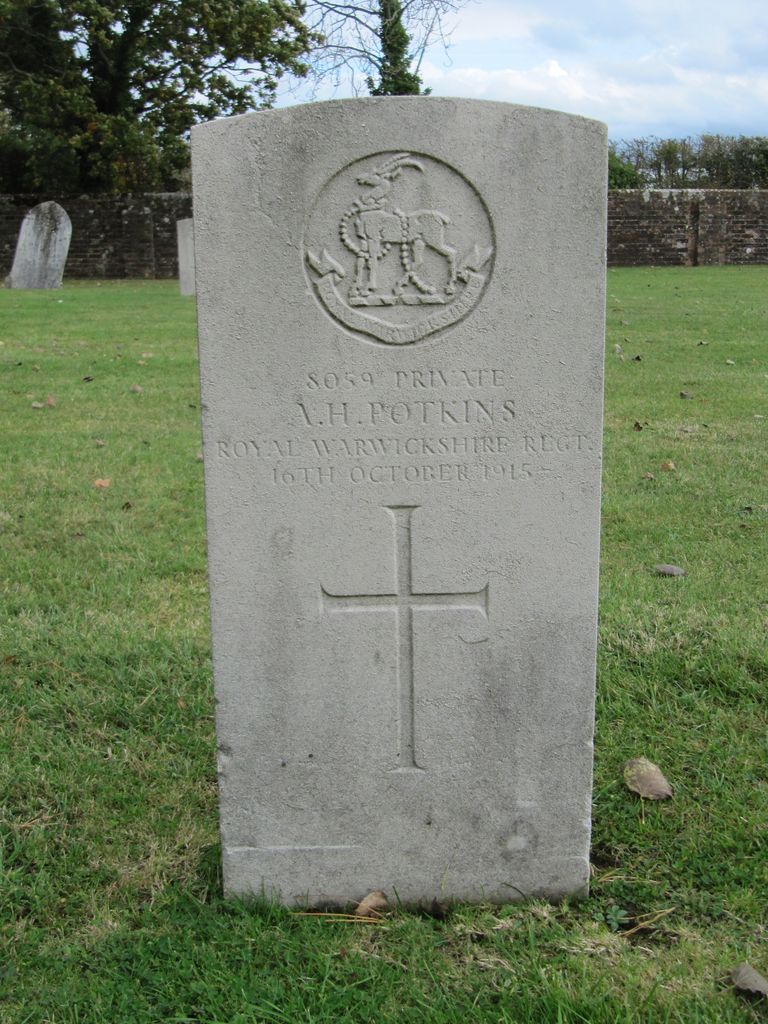|
Location
In Parkhurst Military Cemetery, Forest Road, Parkhurst, Isle of Wight Description Standard CWGC headstone. WW I pattern Grave location : I D 82. (CWGC) | Local plan : 13 |
|
|
Headstone

|
Inscription
8059 PRIVATE A H POTKINS ROYAL WARWICKSHIRE REGT 16TH OCTOBER 1915 + Further Information
CWGC record ...
IOWFHS War Service Reports entry Parents unknown Born : c 1880-2 Deptford, Kent Census Information : 1891 : not found 1901 : not found 1911 : Alfred [sic] Potkins, aged 31, is a Private with the Royal Warwickshire Regiment, at Whittington Barracks, Lichfield, Staffordshire. Documents and Newspaper cuttings :
ISLE OF WIGHT MERCURY
Friday, October 22, 1915 Page 3 SOLDIER SUFFOCATED IN A DITCH The Coroner then held an inquiry respecting the death of Arthur Henry Potkins, 33 years of age, who was found dead in the highway at Parkhurst early on Saturday morning. Private Herbert Smith identified the body, and said deceased was a member of the 3rd Battalion Warwickshire Regiment, of 2, Clarence House, 133, Essex-road, Islington. The deceased and Harrison were out together on Friday night. They went to the Stagg Inn, Horsebridge Hill, between twenty minutes to seven and seven o'clock and left at nine o'clock, closing time, the deceased going ahead. Witness did not see him again on the road. Harrison and witness answered to his name at 9.30. He thought the deceased had already gone in. They had been drinking there some time. He did not see the deceased sitting by the side of the road. If he had he would have picked him up. They did not pass any soldiers. He had been a chum of the deceased for seven years. - By Inspector Sibbick: He accounted for his cap being found by the side of the deceased next morning, because it was a favourite trick on his part to take a comrade's cap. Deceased took witness cap in the public house. Private Bertram Harrison said that when they come out deceased went on in front. He called out his nickname, "Pott," but he got no answer. They had been drinking, but he was sober. Witness reached the barracks at 9.40, and found that deceased was not there, and he never saw him again. Smith told him going down the hill that Potkins had his cap. Alfred Ernest Denham, licensee of the Stag, said when the soldiers left they were all capable of taking care of themselves. They all had their caps. There were no other soldiers in the bar that evening. William Early, Rosebank Cottage, Horsebridge Hill, said he arrived home at 9.15 on Friday night, and found two soldiers opposite his gate in a ditch. Half-an-hour later he went out, and heard two men snoring in the ditch. He did not recognise them as it was foggy. At 10.15, or thereabouts, whilst going to bed he heard two men singing. At one next morning he heard talking. When he got up he saw an overcoat belonging to a soldier and two caps, and he also saw deceased lying in the road. He heard no quarrelling. William Legge, Noke Common, Northwood, a labourer, said he found the deceased at 6.30 a.m. on Saturday, just below the chapel on the other side of the road, about four feet from the hedge. He had his hand doubled up and dug in the ground, as though he had been trying to get up. He was quite dead. There was an overcoat and two caps lying near. There was no mark of violence. Dr. Underhill said he made a post-mortem on Saturday. There were no marks of external violence. The brain was in a congested condition, and there was a marked smell of alcohol. He thought death was due to asphyxiation, but having regard to the position in which the body was found he might have been accidentally suffocated. The Coroner said it seemed to him that these men were badly intoxicated, and it made it very difficult to come to a decision. However, he thought they might accept the doctor's theory. Would the jury like the case adjourned in order that he might issue a subpœna for the attendance of Lieutenant James Long, the R.A.M.C. officer who received the deceased after his death, and who ought to have been present. Fortunately Dr. Underhill had cleared up the matter so far. The jury decided not to adjourn the inquest and returned a verdict to the effect that deceased was accidentally suffocated. Acknowledgements : Janet Griffin for newspaper research Page status : Page last updated : 12 August 2012 (added inquest report) |


Memorials & Monuments
|
|
|